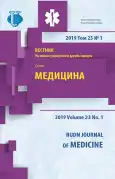FUNCTIONAL FEATURES OF THE MYOCARDIUM AMONG FIRST-YEAR STUDENTS OF DIFFERENT ETHNIC GROUPS WITH REGARD TO THE TYPE OF AUTONOMIC REGULATION OF THE CARDIAC RHYTHM
- Authors: Al-Shammari M.J.1, Pogrebnyak T.A.1, Chernyavskikh S.D.1, Gorbunova I.I.1
-
Affiliations:
- Belgorod State National Research University
- Issue: Vol 23, No 1 (2019)
- Pages: 9-18
- Section: Physiology
- URL: https://journal-vniispk.ru/2313-0245/article/view/345297
- DOI: https://doi.org/10.22363/2313-0245-2019-23-1-9-18
- ID: 345297
Cite item
Full Text
Abstract
The analysis of the dynamics of heart rate and blood pressure components in students of five ethnic groups - Arabic, Indian, African, Latin American and Russian, taking into account the most characteristic types of autonomous regulation of heart rate (HR) with the third moderate predominance of autonomous regulation (MPAR) and the fourth - a pronounced predominance of autonomous regulation (PPAR) HR. A mediocre level of fitness of the cardiovascular system among students: Russian and Arab with MPAR HR at both stages; Indian and Latin American with MPAR and PPAR HR types of regulation of heart rhythm at the 1st stage; African with MPAR HR on the 2nd stage. The rest of the students - a good level of fitness. High vs. normal values of systolic pressure indicate a maladaptive state of groups of Arab and African students at both stages, Indian with the MPAR HR at the second stage. Increased pulse pressure (PP) in Russian students at the second stage with the PPAR HR, among Arabic, Latin American, African students at both stages, notes a decrease in their myocardial functionality against the background of diastolic fatigue and disadaptation to conditions of relative physiological rest. Under conditions of relative physiological rest, the high anti-normal values of systolic blood pressure (SBP) indicated the maladaptive state of groups of Arab and African students at both stages, Indian with MPAR at the 2nd stage. High PD in all subgroups of Arab, African and Latin American students at the 2nd stage with PPAR and at the rest of the groups with MPAR and PPAR HR are objective indicators of myocardial diastolic fatigue, reduction of its functional capabilities and manifestation of maladaptation in conditions of relative physiological rest.
About the authors
M. J.I. Al-Shammari
Belgorod State National Research University
Author for correspondence.
Email: Chernyavskikh@bsu.edu.ru
Belgorod, Russia
T. A. Pogrebnyak
Belgorod State National Research University
Email: Chernyavskikh@bsu.edu.ru
Belgorod, Russia
S. D. Chernyavskikh
Belgorod State National Research University
Email: Chernyavskikh@bsu.edu.ru
Belgorod, Russia
I. I. Gorbunova
Belgorod State National Research University
Email: Chernyavskikh@bsu.edu.ru
Belgorod, Russia
References
- Osadchaya E.A., Petrov R.F. Academic stress as an indicator of the degree of emotional stress the body of students in the process of adaptation to University. Scientific notes of Orel State University. Series: Natural, technical and medical Sciences. 2009. No. 4. P. 40-49.
- Panina A.I., Kolmakova T.S. Indicators of the cardiovascular system of students from Foreign countries in adaptation to the conditions of study in the Russian University. Young scientist. 2013. No. 2. P. 441-443.
- Trifonova T.A., Mishchenko N. In. Klimov I.A. Assessment of adaptation state of students: monograph. Vladimir: publishing House of Arkaim LLC, 2016. 94 p.
- Al-Shammari M.I., Pogrebnyak T.A. Comparative analysis of adaptation of the blood circulation system in foreign students in physiological conditions. A Series Of «Physiology». 2015. No. 1 (3). P. 48-55.
- Kondratyev M.N., Ishekova N. Physical condition of Russian and Indian students studying at medical University. Нuman Ecology. 2012. No. 1. P. 23-28.
- Samarov V.V. Features of adaptation of students of preparatory Department from the countries of Southeast Asia and Africa to process of training at higher school: author. dis.. kand. biol. sciences. Astrakhan. 2014. 22 p.
- Apanasenko G.L., Popova L.A. Medical valeology. A Series Of «Hippocrates». Rostov n/D.: Phoenix, 2000. P. 115-148.
- Shakhanova A.V., Chelyshkova T.V., Khasanova N.N. Functional and adaptive changes in the cardiovascular system of students in the dynamics of training. Bulletin of Adyghe state University. 2008. No. 9. P. 57-67.
- Kapelko V.I. Pumping function of the heart and its regulation. Modern course of classical physiology (selected lectures) / ed. M.: GEOTAR, 2007. P. 263-295.
- Koshelev V.B. Mechanisms of regulation of blood pressure. Selected lectures on modern physiology / Under the editorship of M.A. Ostrovsky and A.L. Zefirova. 2009. P. 178-179.
- Pokrovsky V.M. Formation of heart rhythm in the human body and animals. Krasnodar: Kuban-kniga. 2007. 144 p.
- Shlyk N. Heart rate and type of regulation in children, adolescents and athletes: monograph. Izhevsk: publishing house of Udmurt state University. 2009. 255 p.
- Tkachenko B.I. Systemic hemodynamics. Selected lectures on modern physiology. Under the editorship of M.A. Ostrovsky and A.L. Zefirova. The Art Café. 2009. P. 138-139.
- Khursa R.V. Pulse blood pressure: role in hemodynamics and applied possibilities in functional diagnostics. Medical news. 2013. No. 4. P. 13-19.
- Mikhailov V.M. Heart rate Variability. Practical experience. Ivanovo, 2000. 200 p.
- Shlyk N.I., Zufarova E.I. Standards of indicators of heart rate variability in the studied 16-21 years with different predominant types of autonomic regulation. Bulletin of the Udmurt University. 2013. Vol. 4. P. 97-105.
- National clinical guidelines / R.G. Oganov, M.N. Mammadov. M., 2009. P. 12-13.
- Sinyakov A.F. Secrets of vitality and health. M.: CJSC Publishing house EKSMO-Press. 1999. 464 p.
- Grechishkina S.S. The Influence of sports exercise on the regulatory-adaptive possibilities of the cardiorespiratory system of organism of students: author's abstract of dis.. kand. biol. sciences'. Maykop, 2012. 29 p.
- Spitsina T.A., Spitsin A.P. The Heart rate and the Central hemodynamics of young people with mild arterial hypertension [electronic resource]. Pedagogical-psychological and medical-biological problems of physical culture and sport, 2010. № 21 (15). Mode of access: http://www.museum.ru/.
- Naumova V.V., Zemtseva E.S. Indicators of blood circulation and heart rate variability for three types of hemodynamics in adolescence. Bulletin of the Russian Academy of medical Sciences, 2008. № 3. P. 6-9.
- Eremeev V.S. Mechanisms of blood pressure level formation (sympathetic nervous system and humoral factors). PhD Thesis. SPb., 1996. 39 p.
Supplementary files









